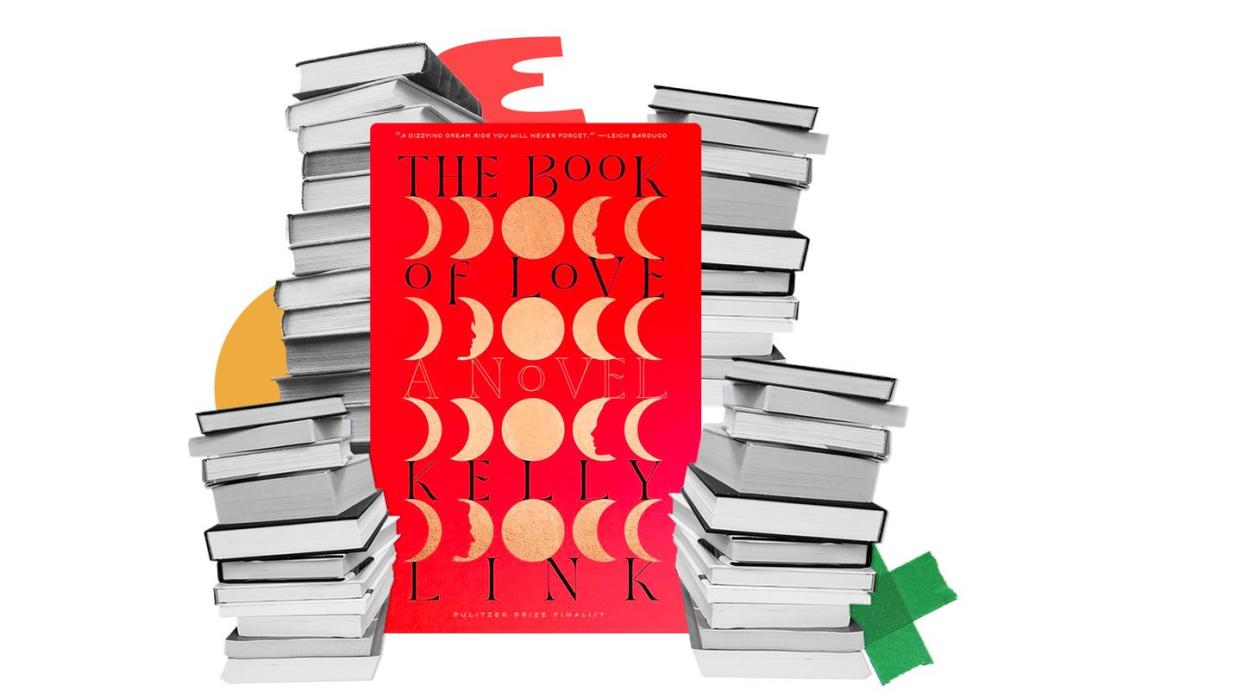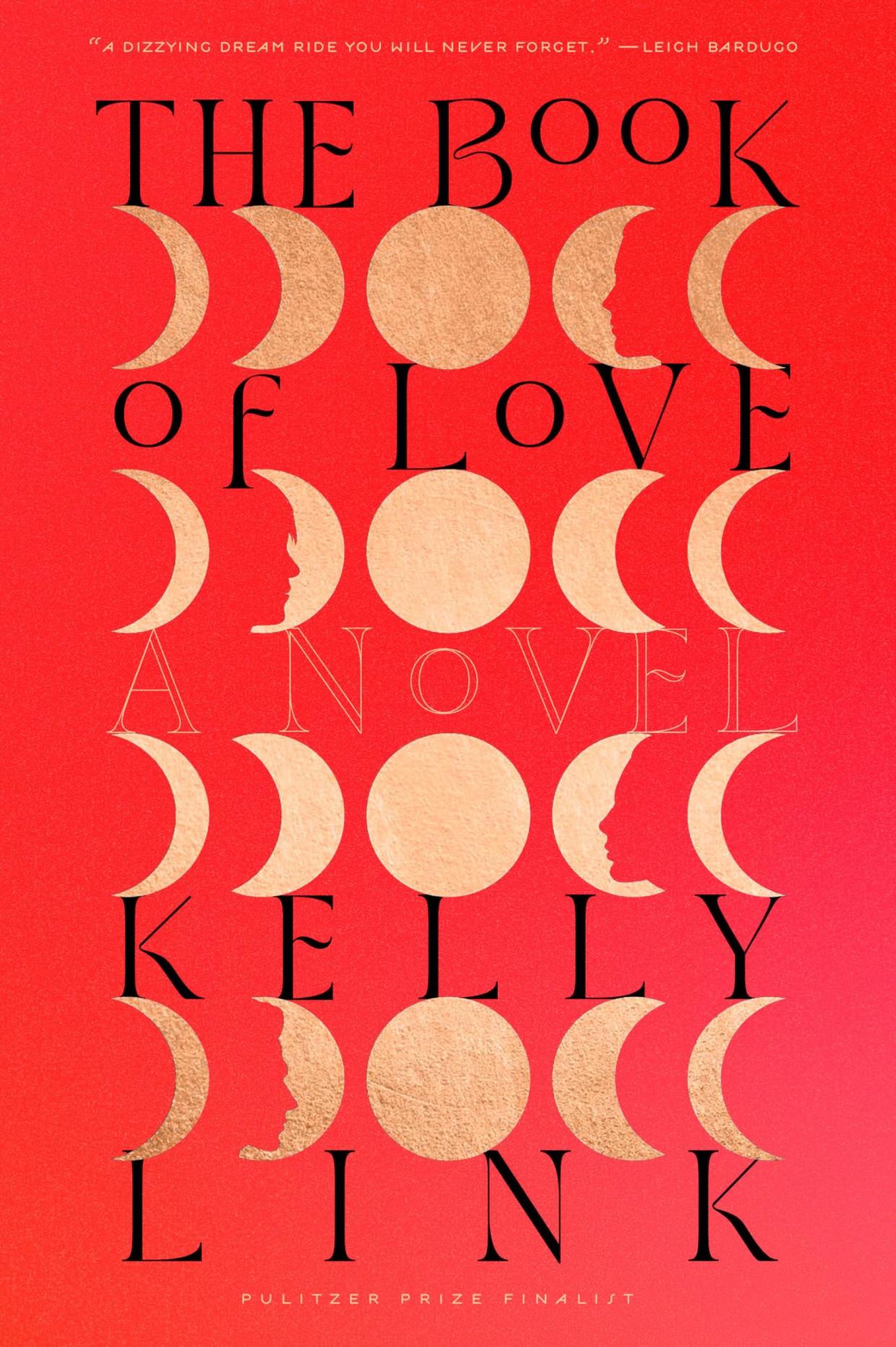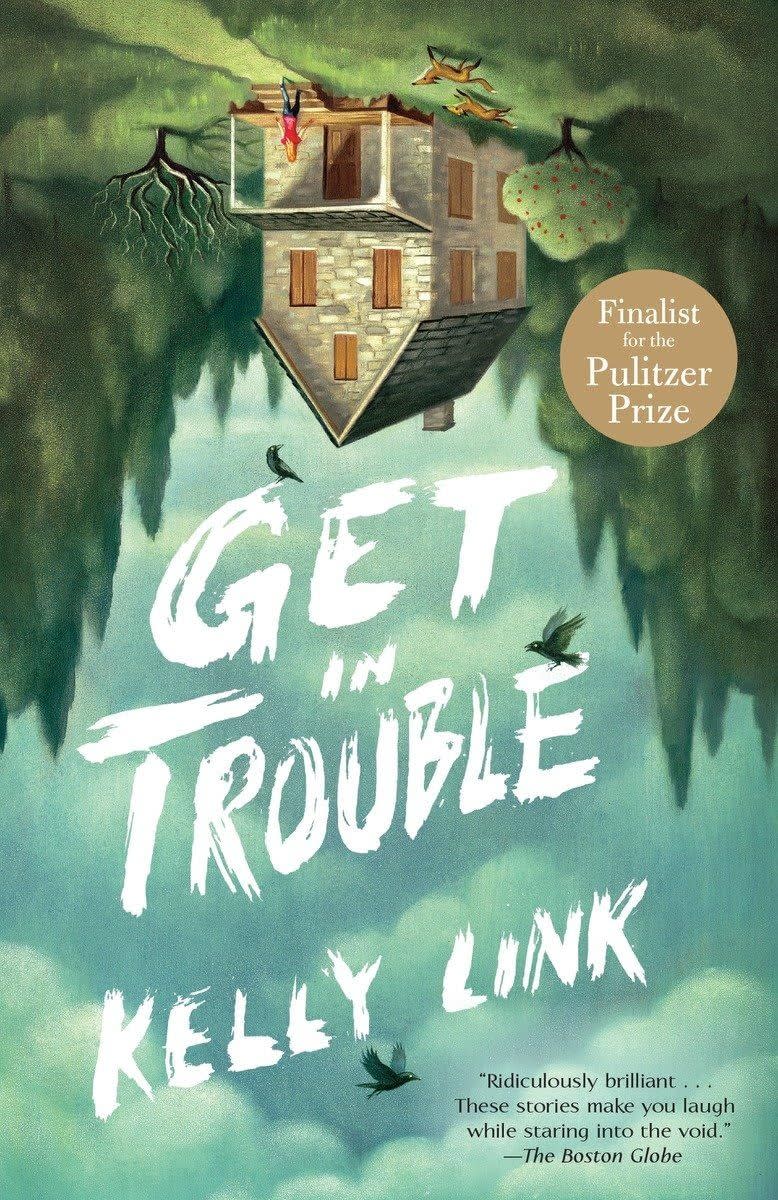Into the Unknown With the High Priestess of Fabulist Fiction

"Hearst Magazines and Yahoo may earn commission or revenue on some items through these links."
Twenty years ago, I stumbled across a copy of Neil Gaiman’s American Gods at a Barnes & Noble in Chattanooga, Tennessee. At first I was only drawn to the cover, where lightning illuminated a distinctly Midwestern highway. But as I devoured the book over the next three nights, I knew I was reading an instant classic that people would be talking about for decades. I say all of this because since then, I've only felt this way about a handful of books—and Kelly Link’s first novel, The Book of Love, is one of them. I honestly think it’s a masterpiece.
Set in the fictional town of Lovesend, Massachusetts, where “toffee Victorians” and “single-family Capes” line the leafy streets alongside “chicken coops and soccer nets in the backyard, ”The Book of Love tells the story of four high school students investigating why three of them died, only to be resurrected nearly a year later by their music teacher, who may be more god than human. Over the course of a few days, Lovesend becomes the battleground for a cold war between otherworldly deities, ghosts, witches, and creatures. Meanwhile, the human characters search for a way to avoid returning to the realm of the dead, where they only remember “a lot of trees,” the smell of roses, “and under the roses, something burning.” Along the way, Link interrogates the nature of love between friends, lovers, siblings, parents, grandparents, teenagers, and even animals.
The small-town world Link conjures in The Book of Love—one full of nuanced relationships between a large cast of characters, local history and cosmic mythology, and magic hiding in plain sight—is among the most detailed and immersive ever put to paper. It also makes for an extraordinary comfort read, and an emotional reminder of what we lose and gain as we age.
After establishing herself as a singular voice in science fiction and fantasy with five short story collections—including the 2016 Pulitzer Prize finalist Get in Trouble—Link’s 600-page novel is one of 2024’s biggest literary events. From her home in the hilltowns of Massachusetts where she and her husband run an independent bookstore, Book Moon Books, Link spoke with me over Zoom about whether she believes in ghosts or afterlives, nighttime logic in literature, adolescence as a liminal space, and what she’s writing next. This interview has been edited for length and clarity.
ESQUIRE: When and where did this book begin for you?
KELLY LINK: I’m a writer who finds it very useful to have a deadline, so when I sold Get in Trouble to Random House, I sold them a novel as well, on the grounds that it would make me actually write one. My plan was to write a very short haunted house novel, but I just could not come up with the thing that gave that book a heart. So I fell back on [The Book of Love] because I had a sense of the characters, and unlike the haunted house project, I could see why it would be different from a short story. And then of course it took eight years from that point to turn it in.

amazon.com
$27.90
Why did The Book of Love need to be a novel instead of a short story?
Honestly, it seemed like it could be a trilogy. But I like compression, and believe it or not, this is a very compressed story as a single novel as opposed to if it were a series of books. There is space to imagine what might happen to these characters at the end, but the only thing I removed when I cut it down to one book was a loving pastiche of Regency romance novels. I was going to move the characters into that space for a whole book, and it would have been fun, but I don't think it was necessary.
How important was it for you to capture a sense of place? How much of Lovesend was inspired by Northampton or real towns on the Massachusetts coast?
The setting is a combination of lived experience and wish fulfillment. Easthampton and Northampton and all of the hilltowns up here have a really distinct vibe, and a strong commitment to supporting quirky local businesses. When you live in a town that isn’t too big, that place begins to feel as if it’s a distinct living organism. If you live somewhere long enough, you mourn the ways in which a community changes. But when you write a book, you get to make things last in a way that they don't in the real world. Lovesend is an idealized version of that: there are people who have lived there for a long time who can still afford to live there, and climate change is not yet impressing upon this place in the way that it will very soon.
Why set this story at Christmastime in 2014?
The question of where in the contemporary moment to set it was a real issue, both in terms of music—because these are all characters with strong feelings about music—but also in terms of how the real world impinges on the characters. 2014 is the period when I began thinking about this project, so part of the tonal quality of the novel comes directly from a particular historical moment which is receding swiftly from us. I did think about what setting it at Christmastime would do to the tone. It was fun to take a holiday that wasn't Halloween—my favorite—and try to Halloween-ify it a bit, but I also hope it provides a certain amount of solace and comfort.
Why did you set the main characters in The Book of Love in high school as opposed to college or adulthood?
I did think about making them much older, but adolescence is a liminal space. It’s a period in which you’re experiencing enormous change. You’re figuring things out about yourself, but you’re also more likely to make leaps into the wild. For me, these characters needed to be people whose impulsivity or decision-making felt more unpredictable, with fewer guard rails.
The first half of the book in particular is written in a maximalist style that zooms in on small moments, memories, and details. Why did you take that approach?
Since this is a book about people coming back from the dead, the granular aspects of life—both the things that are irritating but also the things that give us delight—seem important, because those are the things that keep us alive, right? If you lose joy or interest in those things, it gets hard to keep on going.
These characters have to make a decision about how badly they want to stay alive, so it seemed important to me that they have a hypersensitivity to pieces of their lives that feel very minor, like the noise that somebody makes when they're vacuuming, but also, to quote a meme, like a “bitch eating crackers,” when you’re so irritated by somebody that every single thing that they do becomes irritating. That kind of intensity seemed true to the characters within this narrative space.

amazon.com
$13.79
How do you get inside so many different fictional people's heads with that level of intimacy?
If I'm going to care about the things that happen to somebody, I need to care about how they see the world in granular detail. The job of the writer is to make those details as interesting as possible, or as propulsive and connected to the events in the book as possible. I'm not going to succeed at doing that for every reader, but I have to feel I’ve at least made them connective and interesting to me and the readers who are willing to go along with it.
You’ve spoken about “nighttime logic” in fantasy fiction before. What does that term mean to you and how did you use it in The Book of Love?
Nighttime logic vs. daytime logic is a way of thinking that Howard Waldrop came up with to talk about how narrative logic holds together for the reader as much as for the writer. With daytime logic, there is an explanation for things that happen, and clocks tell time in the way you would expect. Even if strange or fantastical things happen, there's a rule book by which they work that will be explained to you. A lot of realistic fiction, and a lot of science fiction and fantasy, rely on daytime logic: here's something startling, but I'm going to explain how it functions in the world. Even ghost stories, which are often rooted in the inexplicable, have a kind of daytime logic to them: somebody is haunted because they did something wrong, and this is the consequence.
Nighttime logic is more like carnival logic. Normal roles are upended. Like in the James Theraper book, The 13 Clocks, things are happening which will not be explained, but which signal that the world has become a very strange place. It's not quite the same as dream logic, where first you're in one setting and then you're in another, or you’re holding a cup of tea and then suddenly it becomes something else. We know dream logic, but nighttime logic is when you have a sense that there is an organizing principle behind the world that belongs to the writer. The writer may not explain it, but there is a kind of coherence to it, even if it feels unnerving.
David Lynch is a great example of nighttime logic—there's an estranging quality to his work. A lot of horror operates in nighttime logic, and frankly, a lot of realistic fiction does, too—Joy Williams is great at that, and Barbara Comyns.
Do you often write at night to help you get in the right mindset?
I do my best work between 3:00 p.m. and 1:00 a.m. My writing brain gets sharper the farther we get into the afternoon. If I could organize my life so that I push that window further, I would be quite happy! If I'm on a retreat, I can work until three or four o'clock in the morning. I can write pretty much anywhere. I have an office, but I like being closer to other people when I work, so mostly I write down in our dining room. Ideally I work in a room with other writers. I’ve always gotten more writing done if I can see other people engaged in the same work, either having a great time or floundering.
Death plays a large role in this novel, as it does in many of your short stories. Has writing about it so often changed your perspective on mortality?
I saw somebody—maybe Nick Harkaway?—say that writers are generally catastrophists. You get on a plane and if you're a writer, you immediately start thinking about what happens if the plane crashes, because you think about the most dramatic possibilities.
I was always somebody who was drawn to ghost stories, and death is always going to be part of a ghost story. I was the child of a pastor who then became a psychologist, and those are professions where you're dealing with heavy, confusing things. I don't know why writers end up with the material that they draw from over and over again. You end up with a range of interests that you have an emotional connection to as a writer that you’re going to explore. For me, it's the fantastic—and monsters, and loss, and death—but it's also about how people see the world and what they celebrate.
I don't think writing about death has changed how I see the world, but I do think it gives me a framework for thinking about the way I want to live. The pandemic has been a hard thing to go through. We had to close the press that my husband and I have run for over 20 years because my husband has long COVID. We have to be very careful about going out into the world because of the chance of exposing him to something that could make his health even worse. When you write fiction, you’re in charge of the things that happen, but you also get to work through the emotional costs and realities of dealing with very heavy stuff.
Do you believe in ghosts?
A few years ago, a good friend of mine—Holly Black, the author of The Spiderwick Chronicles—got a letter from a kid that said, “Dear Miss Black, I need you to tell me if fairies are real, and don't lie to me like the other adults.” She wrote back, “I've never seen a fairy, but I know people who say that they have.” That's how I feel about ghosts. I collect other people's ghost stories. There are many that I find either persuasive or troubling. I've never seen one, but I fully believe that some people just don't have the antenna or the radar. I was always bad at telling if somebody was drunk. So maybe I do see ghosts. We could be seeing ghosts all the time but we just don't know it.
Do you believe in an afterlife of some kind?
I think I do. Maybe some of that is a holdover from a childhood spent in a lot of churches with a father who was a Presbyterian minister. But I'm agnostic. I would very much like to believe that there is something after death, but I find the fact that I don't know kind of exhilarating—that there is a mystery to which we all either do or don't find out the answer. That seems kind of cool, that maybe there's something interesting aside from the process of dying—that maybe you get to find out.
I have a hard time at the moment with a lot of things that are happening in the world. Not knowing becomes troubling when you see so much suffering and so much needless cruelty and death. It seems wrong to think there's life after death and maybe it will be better there, because that's just a reason not to fix things. But at the same time, the idea that there's nothing past death makes watching suffering that you can't do anything about feel even harder.
If The Book of Love is a standalone novel, what are you writing next?
[Another] novel, which is a haunted house story. I want it to be economical. Small. More experimental. If a novel is a large boulder the size of a large boulder, the next thing I want to work on is a small boulder the size of a large boulder—a classic 50,000-word ghost story novel that feels like a short story.
You Might Also Like
